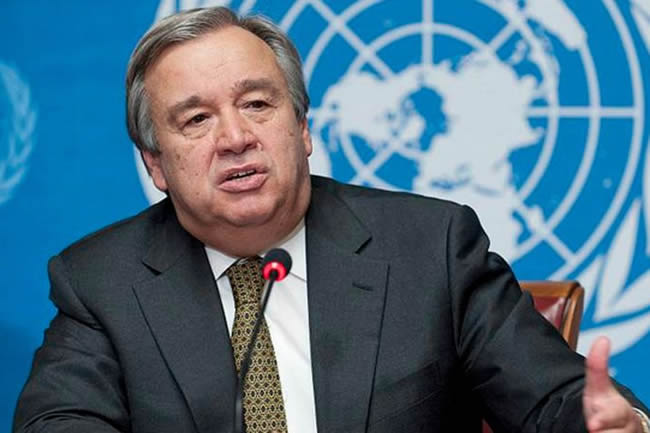
U.N. Secretary-General Antonio Guterres said Thursday that limited humanitarian assistance to Palestinians living in Gaza is not enough, it must be ongoing and at scale.
“It is not one small operation that is required; it is a sustained effort to deliver humanitarian aid to the people of Gaza,” Guterres told reporters in Cairo, where he has gone to oversee U.N. preparations for the aid operation. “In plain terms, that means humanitarians need to be able to get the aid in and they need to be able to distribute it safely.”
The U.N. chief spoke at a joint press encounter with Egyptian Foreign Minister Sameh Shoukry. Egypt controls the Rafah border crossing into Gaza, which has taken on critical importance in international efforts to get relief supplies into Gaza. Guterres said Rafah is a “lifeline” for Gazans.
The Hamas-controlled Gaza Strip has been under a complete siege by Israel since its militants carried out a brutal and deadly terror attack inside Israel on October 7, killing 1,400 Israelis and abducting nearly 200 more to the Gaza Strip.
“For nearly 2 weeks, the people of Gaza have gone without any shipments of fuel, food, water, medicine and other essentials,” Guterres said. “Disease is spreading. Supplies are dwindling. People are dying.”
Guterres called this week for an immediate humanitarian cease-fire and repeated his appeal in Cairo, where Egypt’s foreign minister echoed the urgency for it.
“I’m hailing the call launched by his excellency the secretary-general to pause immediately and to cease fire in order to de-escalate any kind of conflict, and to stop and to staunch the bloodbath of the Palestinian people,” Sameh Shoukry said.
U.S. President Joe Biden said Wednesday in Tel Aviv that Israel has agreed to allow limited humanitarian assistance to begin flowing into Gaza from Egypt, with the caveat that it would be subject to inspections and that it should go to civilians and not Hamas. Reports say that about 20 aid trucks could move as soon as Friday, although it was not clear if any U.N. trucks would be a part of that agreement.
In the meantime, the United Nations has flown in more than 3,000 tons of supplies that are ready to go through Rafah to southern Gaza as soon as it is safe to do so. The World Food Program has 1,000 metric tons of ready-to-eat and canned food — enough to feed nearly half-a-million people for one week — at Rafah or on the way there.
Israel has carried out several airstrikes on Rafah in recent days, however, damaging the crossing and making it unsafe for humanitarians. They must wait for diplomats to secure the necessary security guarantees from Israel.
Source: voanews.com























